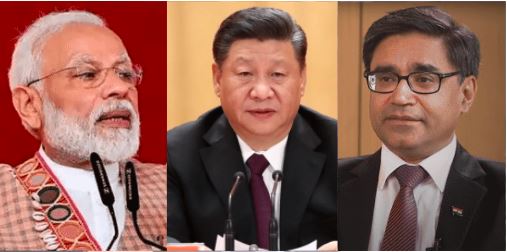Can someone call China stubborn, belligerent and aggressive while being in China? Well, Indian Ambassador to China, Vikram Misri can.
In a candid address at the opening session of 7th ICWA (Indian Council of World Affairs)-CPIFA (Chinese People’s Institute of Foreign Affairs), Misri took a number of sarcastic jibes at China and schooled China on a number of issues. The broad theme of Misri’s address was how border tussles and broader bilateral relations cannot go hand in hand. He also told China that no country can dictate its own terms in a multicolour world order.
As for the Sino-India relations, Misri said, “When we speak of a development agenda, it is useful to remember that as recently as May 2020, which is less than a year ago, seeking a closer developmental partnership for the 21st century had been the keynote of the India-China relationship.”
So, basically, the Indian envoy made a reference to Chinese aggression in India’s Eastern Ladakh straight away. An ongoing military stand-off between India and China started in the months of April and May last year after Chinese troops engaged in face-offs with Indian troops and also heightened deployment in the Eastern Ladakh sector of the effective Sino-India border.
What Misri was trying to do is to remind Beijing that the Sino-India relationship will not move forward amid the escalating border tensions. The Indian Ambassador underscored the importance of “elaborate mechanisms and parallel structures for border control” that helped “create the environment in which the India-China relationship grew spectacularly between 1988 and 2019.”
The Indian envoy was actually looking to contradict Sun Weidong, China’s Ambassador to India. The Chinese Ambassador had said, “The boundary dispute is a reality and should be given sufficient attention and taken seriously. However, the boundary question is not the whole story of China-India relations and should be put at a proper place in the overall bilateral relations.”
Misri declared India’s unwillingness to normalise ties with China unless the boundary issue gets resolved. He said, “It is tempting today to remember this period with a touch of nostalgia, and to argue that we should shelve our differences and things should immediately go back to the way they used to be.”
Misri added, “But we must acknowledge that these enabling structures and the fundamental premise of the closer developmental partnership have been placed under considerable strain by the serious incidents and the resultant violation of peace and tranquility at the Line of Actual Control in Eastern Ladakh in April 2020 and thereafter.”
Taking another dig at Chinese diplomats and officers, who often try to downplay the border tensions, the Indian Ambassador added, “We have also seen a tendency in some quarters to sweep this situation under the carpet and characterize it as just a minor issue and a matter of perspective. This too is inadvisable as it can only take us further away from a sustained solution to present difficulties and deeper into an unfulfilling stalemate.”
Misri’s lengthy remarks on Sino-India ties in the shadow of the ongoing military stand-off highlight how China has been getting troubled by the overall decline in Sino-India ties. Following Chinese military provocation last year, New Delhi has made it a point to hurt the paper dragon in every possible area of bilateral relationship including the economic ties between the two countries.
India has managed to inflict very heavy costs on Beijing by banning Chinese apps and reducing imports from China. On the other hand, Beijing kept pleading for normalisation of the bilateral relationship, but India remained unmoved. Misri has again hinted that India will keep decoupling itself from the Chinese economy, unless and until there is peace and tranquillity at the border.
Misri’s remarks also touched upon larger Chinese belligerence across the Indo-Pacific, and how Beijing is an obstacle in the spirit of multilateralism. The Indian Ambassador said, “….it is clear that only statements in favor of multilateralism will not be sufficient.”
Misri’s remark was, of course, aimed at Chinese diplomats, officials and State-run publications which keep mentioning the need for multilateralism every time the free world criticises Beijing’s actions. The Indian Ambassador made it clear that China’s own actions violated the spirit of multilateralism and went on to explain how.
Misri said, “In a multipolar world, no country can set the agenda by itself without prior agreement and consultation, and then expect everyone else to come on board. No single country can expect a discussion to focus only on issues of its own interest while ignoring those raised or reflected by others. And no country should imagine that it has sole control over the narrative about a relationship or its actual course.”
These remarks almost go as far as rebuking China. They can as well be read in light of China’s aggression in its entire neighbourhood, be it the South China Sea, the East China Sea or the Himalayas. China bullies ASEAN members like the Philippines, Malaysia, Vietnam and Brunei. Yet, in its interactions with the intergovernmental body, Beijing expects that trade and investments will be the only subject of discussion.
Similarly, China has been acting aggressively around Japanese waters near the Senkaku Islands. The paper dragon even claims the Japanese Islands, yet it expects Tokyo to enhance bilateral partnership instead of pushing back against its frequent transgressions.
Also, China wants complete control over the narrative. Beijing likes to believe that Taiwan is a part of its territory under the ‘One China policy’. Therefore, it tries to intimidate others against a closer relationship with the island nation. But such dogmas and high-handedness are clearly at odds with the spirit of multilateralism.
The Indian Ambassador spoke at length and every part of his candid address bordered on a strict admonition of China’s authoritarianism and belligerence. India’s Ambassador thus slammed every single Chinese policy while being in China.
